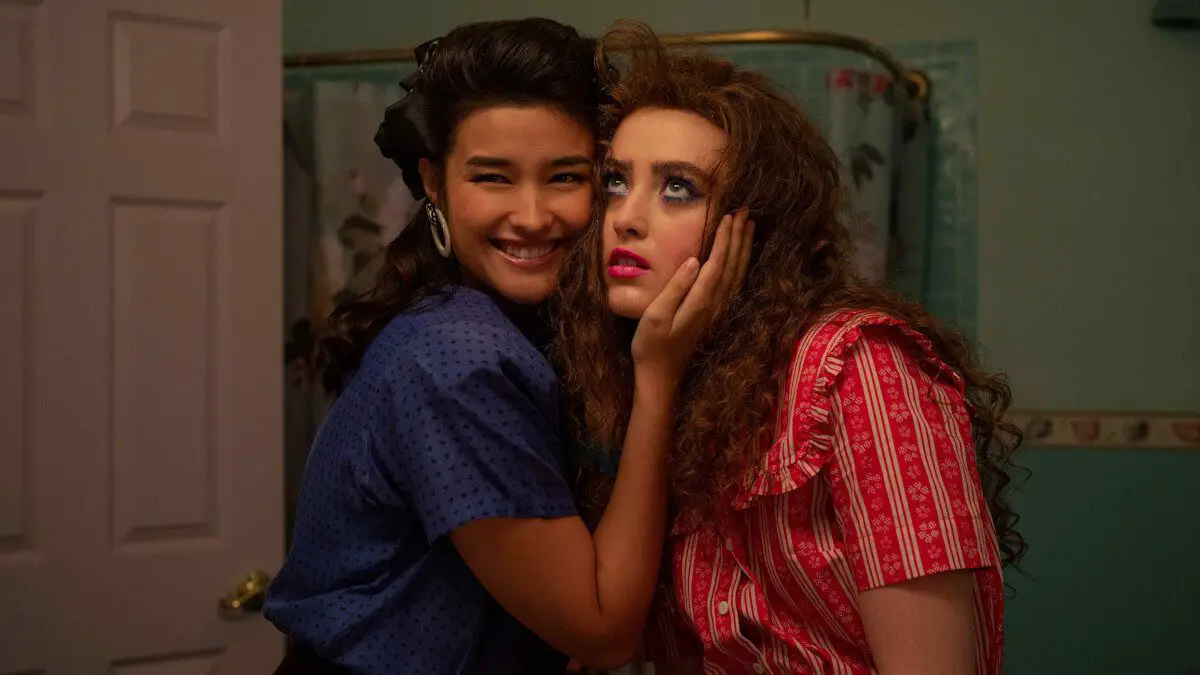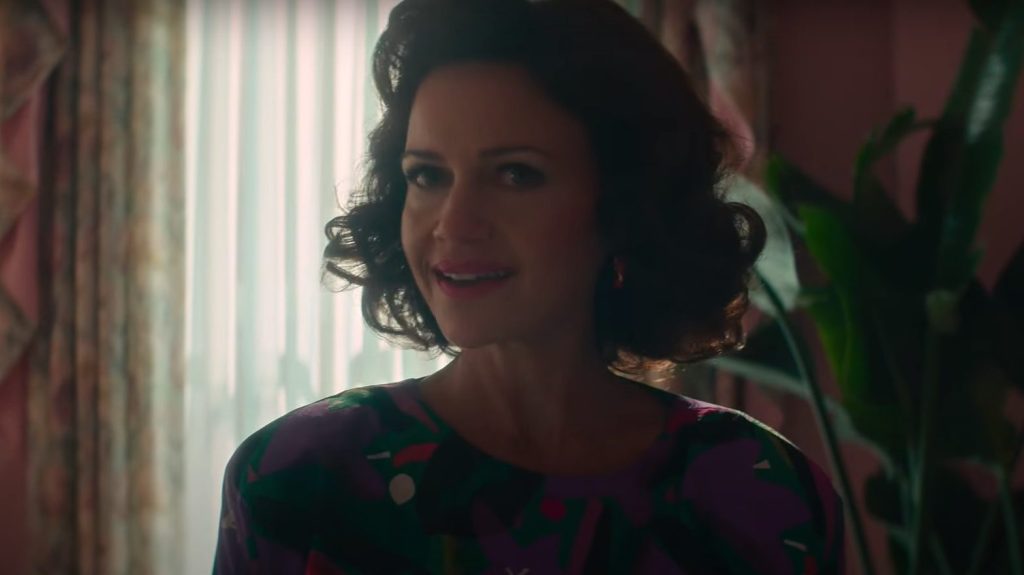Lisa Frankenstein is humorous more than funny, with Zelda Williams’ wallowing in her 80s suburban goth, making up much of the joke. Willaims juggles varying tones, from dark wit to sight gags to macabre puns. It’s a debut filled with a buffet of tones that miraculously never feels disjointed.
Williams’s debut is more a riff on Mary Shelley’s classic tale than a modern adaptation. Diablo Cody’s script is less interested in a man fascinated with re-animating dead people and more interested in how teenage girls deal with life. Cody’s script crackles with her usual acerbic wit as it follows Lisa Swallows (Kathleen Newton) moping and strutting her way through her own personal hell: the suburbs during the 80s.

Lisa isn’t a science nerd; she’s a book nerd. She spends her time in the Bachelor’s Graveyard, reading and writing poetry as she dreams of hunky Michael Trent (Henry Eiken berry), the editor of the school paper. Granted, she does have a crush on one of the busts on a tombstone in the graveyard.
Williams slyly tells the story of Cole Sprouse’s Creature through animated shadows during the opening credits. He’s a piano player who killed himself because of unrequited love. One day at the graveyard Lisa leans into the bust and whispers she wishes she was his.
You can’t blame Lisa for falling in love with the bust of a Victorian emo teen. After all, she’s recovering from the trauma of her mother being killed by a masked killer one usually sees in slasher movies; Lisa’s father, Dale (Joe Chrest), has already moved on and married Janet Janet (Carla Gugino). One of the themes of Lisa Frankenstein is everyone else seems not to understand that healing from trauma doesn’t have a certain path. Instead, they expect Lisa to move on as well since they have moved on.
Unlike so many mainstream films today, Lisa Frankenstein has more story than plot, allowing for ideas and themes to saturate the viewer. Refreshingly, Cody’s script also seems uninterested in why any of this is happening, only that it is. There’s a lightning storm and green clouds, and soon, Lisa finds herself face to face with Sprouse’s mud-caked walking corpse, who follows her around like a love-sick puppy. The why of it all is hardly as interesting as seeing how Lisa deals with it all.
Sprouse’s creature is a thankless role. He’s essentially the straight man to Newton’s haywire turn as Lisa. Still, what he does is choice, providing a sense of reason and programatism- or as much as a Victorian corpse can provide. He sees Lisa as she is, not as she sees herself. One of the more refreshing things about Lisa Frankenstein is how Lisa and the Creature’s relationship evolves along the way. Though Sprouse is instantly smitten with Lisa, she is, after all, literally the reason he’s alive. But Sprouse’s Creature feels like a full creation, with a rife interior life he would express if he had a tongue instead of a worm-infested stump.

At least her step-sister Taffy (Liza Soberano), the popular ‘It’ girl, is cool with her borrowing her top. Like most characters in Cody’s work, she allows Soberano to find grace notes and ways of showing the depths of the character’s emotions. Soberano’s Taffy isn’t a mean girl or a snobbish prude. On the contrary, she’s excited to have Lisa as her step-sister and even tries to help her get friends at school. Unlike her mother, Taffy seems to care and understand that Lisa is struggling with her mother’s death. Even as the events of Williams’s Lisa Frankensetien begin to spiral out of control, Taffy remains a bedrock of support.
Soberano is so good and charismatic as Taffy that she could almost spawn a movie of her own. In fact, if Newton’s Lisa weren’t such a wry commitment to demented kookiness, Soberano would have walked away with the movie.
But Newton’s utter self-possession as Lisa, her comic timing, and how she handles Cody’s dialogue are worth the price of admission alone. There’s no way Lisa isn’t a little inspired by the brassy, ribald accordion playing Julie Brown. The physicality of her Lisa is so calculated and yet so alive you can never tell how she’s going to react; it’s a sight to behold.
Lisa and Taffy’s mother, Janet, a nurse at the local psych ward who rounds out the trio more akin to Nurse Ratchet than Florence Nightingale. Janet is a Jazzercise health nut, a caricature of the white middle-class suburban matriarch of the 80s. All smiles and pure venom for anyone who isn’t one of them. Gugino is, it goes without saying, excellent. She dials it up to eleven and gives Fay Dunaway’s “No more wire hangers” a run for its money.
More than anything, Williams and Cody use Lisa Frankenstein as a way to explore that turbulent time of girlhood where everything feels strange and adults feel almost caricaturesque. While also exploring how fraught teenagers’ lives are with trauma, whether it’s your mother getting killed by a slasher, witnessing your boyfriend getting castrated, or being groped by the so-called nice guy at a party, life never tires throwing curve balls.

Willaims and her camerawoman Paula Huidobro bathe every frame in a brightly lit or neon haze, capturing the 80s aesthetic. The aesthetic is the magic of the film; bright and dreamy, it belies the simmering darkness underneath the characters’ surface, the pain, the hurt, and the heartache.
Williams and Huidobro also tie in Lisa’s aesthetic with the film. Her taste for older films and posters of the old Universal Monster movies line her walls. She even has the image from the infamous silent short by George Melies of the man on the moon. Her love of the past likely comes from her yearning for a different time, one where her mother was alive and her mother wasn’t killed by a Jason Voorhees knock-off.
A lesser movie would be obsessed with that plot point. Instead, Williams and Cody have it as a footnote to Lisa’s life. It informs her that it’s a traumatic event. But who or why it happens isn’t the driving force. Instead, Lisa Frankenstein is about a young woman finding herself. As she grows more and more confident and commits more and more murders to get spare body parts for her devoted Creature friend-cum-boyfriend, a peculiar thing begins to happen. The creature grows less monster-like, almost human, a mirror image of Lisa’s growing confidence as she takes hold of her own life.
Williams, Cody, Newton, and Huidobro synthesize all this into a dream-like movie filled with rage and sadness. Lisa Frankenstein is the kind of movie with a re-animated piano player playing REO Speedwagon. At the same time, the main character soulfully sings along, and it’s hilarious and moving all at once. You have to admire a movie that tries to reclaim an infamous 80s anthem from “Glee.”
Lisa Frankenstein is a sloppy French kiss to 80s outsider cinema while also forging its own path through the genre. At times, perhaps a little too pastiche, it nonetheless has more than enough personality, style, and heart to patch together a story throbbing with more than a little dark magic.
Image courtesy of Focus Features
Have strong thoughts about this piece you need to share? Or maybe there’s something else on your mind you’re wanting to talk about with fellow Fandomentals? Head on over to our Community server to join in the conversation!

